Long-Term Concussion Effects, Treatment & More
Concussions can have long-term physical, cognitive, and emotional effects. Symptoms such as brain fog, headaches, and depression can last for months or years after the initial injury. When the...
Published peer-reviewed research shows that Cognitive FX treatment leads to meaningful symptom reduction in post-concussion symptoms for 77% of study participants. Cognitive FX is the only PCS clinic with third-party validated treatment outcomes.
READ FULL STUDY
If you’re like the majority of people who have had a concussion, then you likely recovered a few weeks afterward and have felt fine ever since then. Concussive symptoms typically resolve in 7 to 10 days (sports-related concussions) or within 3 months (non-athletes). But not everyone is that fortunate: up to 30% of post-concussion patients have lingering symptoms that don’t go away with time and rest.
And even if you do recover and walk away with no long-term symptoms, it isn’t without consequence: You will always be more susceptible to another concussion than someone who hasn’t had one, particularly during the first year after your concussion. It takes less force to sustain a repeat concussion within a year of the previous concussion and it’s likely to take more time to resolve. Repeated subconcussive jarring or shaking to the head can contribute to this situation as well.
Many people (especially athletes) who have had one concussion go on to have more. With every concussion, your chance of developing long-term symptoms (post-concussion syndrome) increases.
At our concussion treatment clinic, we’ve treated many patients with repeated concussions whose symptoms did not simply go away with rest the way their doctors assured them they would. This article addresses the questions and concerns those patients had when they came to us. We’ll cover:
If you’re experiencing symptoms that won’t resolve after multiple concussions, you’re not alone. And you’re not crazy. 90% of our patients show symptom improvement after just one week of treatment at our center specializing in post-concussion therapy. To see if you are eligible for treatment, sign up for a consultation.

In this section, we’ll discuss what a concussion does to your brain and how multiple concussions play into that equation. We’ll also go over the symptoms of multiple concussions so you know what to look for.
A concussion (also known as a mild traumatic brain injury, or mTBI) can come from whiplash or jostling, shaking, or hitting your head. When you experience head trauma, your immune system causes inflammation near the site(s) of injury. Regions of your brain affected by the concussion suffer from a temporary breakdown of tiny structures in and around those cells.
During that time, affected neurons don’t get enough oxygen to power the normal signaling your brain does on a regular basis. When you try to do something that those cells govern — like reading or balancing — they won’t be able to accomplish the task. So, other neural pathways will pick up the slack, even though it’s a less efficient path for that information to take.
If you’ve fully recovered from a head injury, your brain will go back to using the normal pathways for any given process. Unfortunately, that doesn’t always happen. Sometimes, impacted cells are still unable to signal for the right amount of oxygen to complete the processes that they used to do. Usually, that suboptimal signaling produces long-lasting concussion symptoms.
The more times you’ve experienced brain trauma, the more likely you are to have long-lasting symptoms because of your brain’s failure to return to normal. The long-term effects of repeated concussions can be responsible for everything from headaches to personality changes to forgetfulness.

Suboptimal signaling pathways in your brain are similar to the different routes you can take on your commute home. Some roads just have more traffic than others. If you have to drive around an accident, you’ll take longer to get home. And if you get stuck in a traffic jam, who knows how long the trip back will take (assuming you don’t just give up and eat dinner at a restaurant while you wait). In those situations, you end up tired and frustrated. What should be an easy trip home, isn’t.
During healthy brain function, communication “traffic” — i.e., the signaling needed for a task like reading — would be equally distributed along existing pathways. Information needing to take a suboptimal pathway is like taking the frontage road instead of the highway. The impacted cells can’t call for enough blood flow (and thus oxygen) to do their jobs, so other cells have to do the job for them.
The more your brain has to use suboptimal pathways, the more tired it becomes. It’s more likely for you to have symptoms. And with multiple concussions, there are simply more opportunities for that to happen. (Note that severity depends on the individual patient. You could have persistent, severe symptoms from just one concussion.)
The good news is that those pathways can be mended — just not without a combination of physical and cognitive therapy under the direction of a trained medical professional. We’ll talk more about that in the treatment section below.
The long term effects of multiple concussions are wide-reaching. In addition to causing brain dysfunction, concussion can cause dysfunction in the vision and vestibular systems, in the autonomic nervous system (ANS), and even in hormone production. As a consequence, you can experience symptoms throughout the body in almost any organ system — from blood pressure and breathing dynamics to skin health and energy levels. Fortunately, the ANS, vision, and vestibular systems all respond to therapy to some degree.
The autonomic nervous system controls heart rate, breathing dynamics, blood pressure, rate of digestion, and many of the other bodily functions we don’t think about that keep us alive. It has two primary parts: the sympathetic nervous system (SNS) and the parasympathetic nervous system (PNS). The SNS and PNS regulate your “fight or flight” and “rest and digest” processes, respectively. But concussions can disrupt the delicate interplay between the SNS and PNS, resulting in a host of cognitive and physical symptoms.
Further reading: Post-concussion autonomic nervous system dysfunction
The vision and vestibular systems can also be affected by concussions. A mild TBI might confuse the region of your brain that processes visual information, or it might disrupt communication that helps your eyes work together seamlessly. Likewise, signaling between your eyes, ears, brain, and body could be affected, resulting in vestibular symptoms such as dizziness, nausea, and spatial disorientation.
Further reading: Post-concussion vision problems and Vestibular therapy for concussion
Hormone dysfunction is another possible long-term effect of concussion. The pituitary gland and hypothalamus can both experience neurovascular coupling dysfunction, which can then lead to inappropriate hormone levels (either high or low). Concussions can affect your levels of growth hormone, cortisol, thyroid hormone, sex hormones, and more. Hormone dysfunction is serious and should be treated by an endocrinologist with knowledge of how head injury affects hormone production.
Further reading: Hormone dysfunction after concussion and How to talk to your doctor about hormone imbalances

The symptoms of multiple concussions are the same as the symptoms of one concussion. Multiple concussions over time just mean the long-term effects of concussions are more likely to be noticeable and may take longer to resolve. Symptom severity depends more on the individual — things like genetic predisposition, for example — than on how many concussions you’ve sustained.
We’ve written at length about concussion symptoms, so we won’t reproduce all of that here.
For reference, here’s the symptoms of a concussion checklist we created:
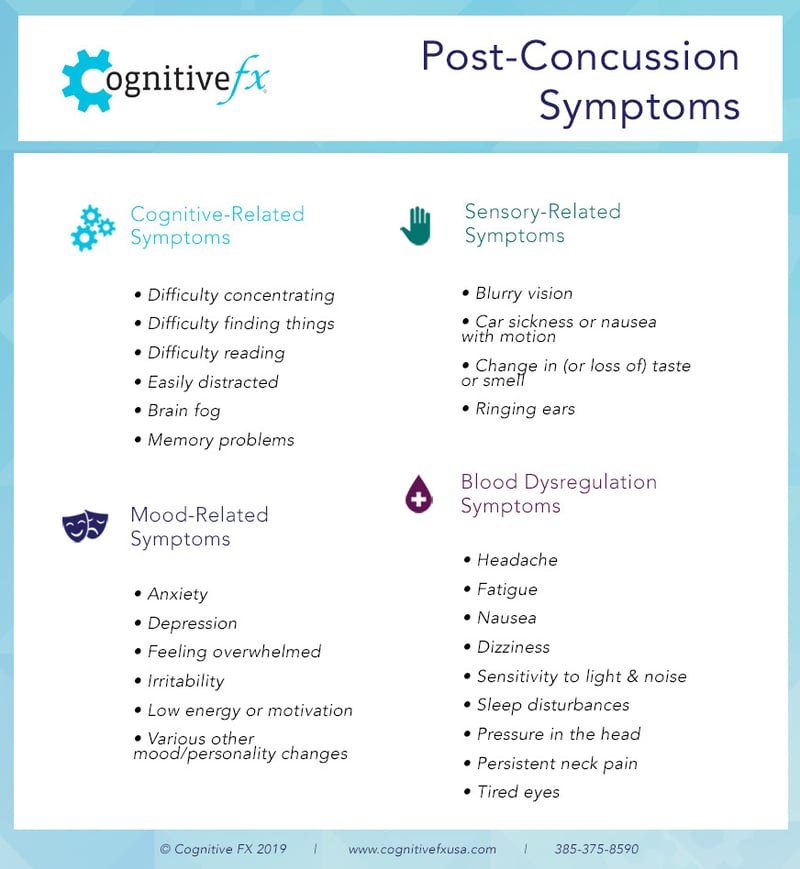
Cognitive impairment from head trauma can present in many ways — short-term memory loss, “foggy” thinking, blurred vision, difficulty finding things… As you can see above, the list is extensive. But lingering concussion symptoms aren’t limited to the cognitive: You may find you have balance problems, experience heartbeat irregularities, or get carsick (when you didn’t before your concussion).
Here’s a closer look at what might happen if you’re experiencing post-concussion ANS dysfunction:
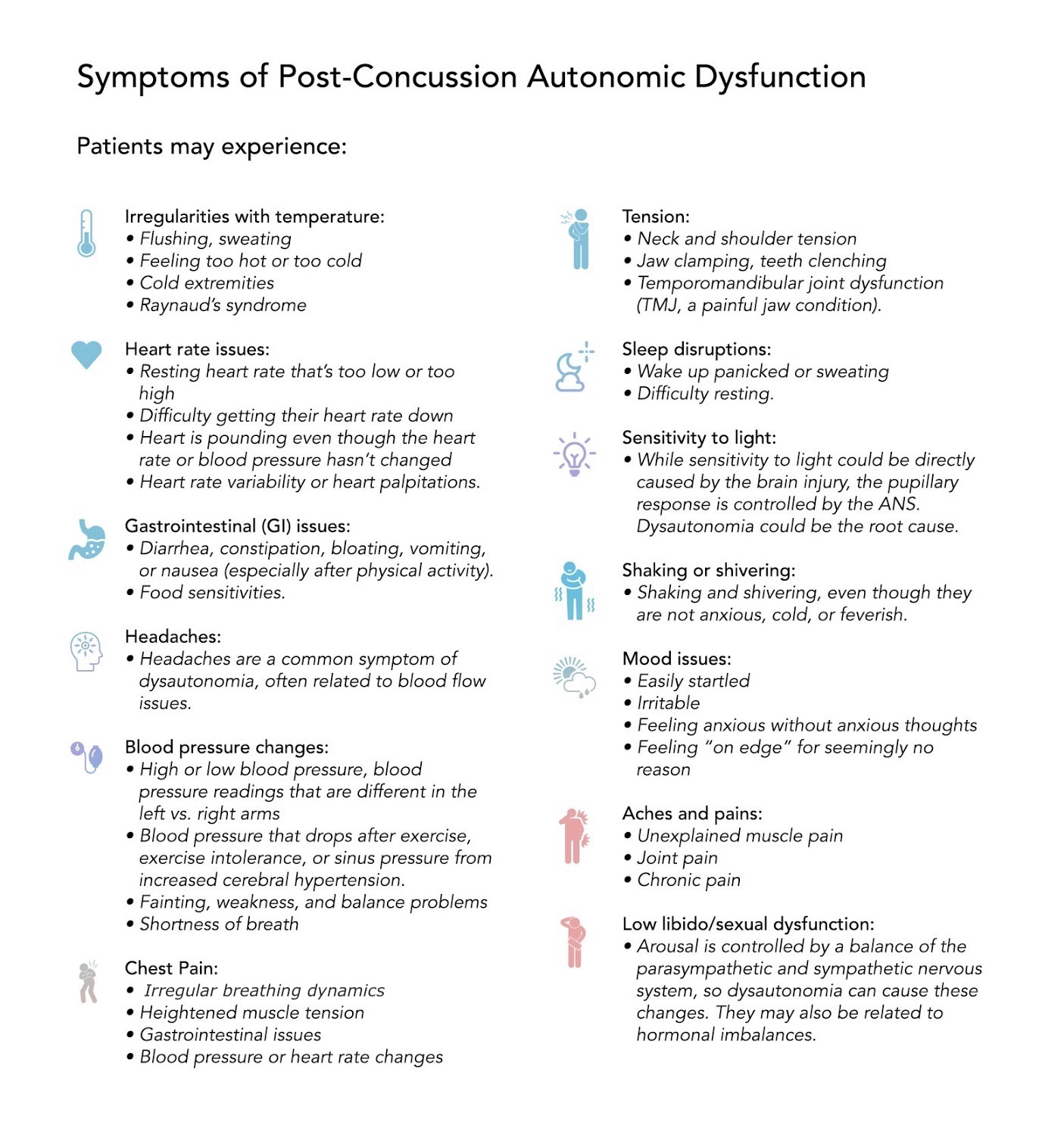
Here’s some further reading on specific symptoms:
While the cumulative effects of repeat concussions can produce an increase in number or severity of lasting symptoms, that isn’t guaranteed. Some patients who have experienced just one concussion suffer worse symptoms than patients who have sustained a number of concussions.
While you might think that loss of consciousness at the time of injury is the best indicator for longer-lasting symptoms, that isn’t the case. In reality, mental confusion at the time of your injury is the greatest risk factor for long-term consequences.
Yes, multiple concussions can cause depression, anger, memory loss, and other symptoms that make you feel unlike yourself. Brain damage from a concussion can cause lasting emotional symptoms that do not resolve without treatment. Or, they may make existing struggles worse.
Searching for a diagnosis after one or more concussions is difficult, to say the least. Some healthcare providers will ignore emotional symptoms or tell you it’s all in your head. And while you may find helpful coping mechanisms from a psychologist, you won’t get treatment that fixes the root cause (if it’s from a concussion). That cycle of being told you’re crazy — or that no one can help you — only makes symptoms worse.
Here’s some further reading on mental health and the emotional effects of a concussion:
Note: Many of our patients were told that their condition is untreatable. That’s not true. Post-concussion syndrome is not a condition that many healthcare providers treat, but it is often treatable. There is hope. To learn if you’re eligible for treatment, schedule a consultation with our staff.
We recently created an online course that covers which types of headaches you can get after a concussion, as well as specific techniques for coping with those types of headaches. If you want to learn how to manage your headaches at home, visit our course.


Athletes — especially those who play contact sports like football and ice hockey — are at higher risk for multiple concussions than the general population. If you’re an athlete recovering from a concussion, do not return to your sport until you are fully healed. Follow the return to play protocol found on the website of the Centers for Disease Control and Prevention. Whether you’re a high school athlete, college athlete, a retired athlete, or still competing later in life, the dangers are the same.
Unfortunately, sustaining one concussion means that you are at risk for more. During recovery, your brain needs time to heal. Head trauma could affect coordination, balance, and other skills needed to keep you safe during practice. You’re more likely to get another concussion when those abilities are compromised.
It’s worth noting: If you sustain a second concussion while recovering from the first concussion, you risk longer-lasting symptoms and brain damage. In extremely rare cases, some patients die from “second impact syndrome”, a condition we don’t fully understand, that involves a rapid swelling reaction in their brains. Never return to sports before your concussion has healed. If you do experience a second concussion within a few days of the first, seek medical attention immediately.
Even when you’ve healed from your first sports concussion, you are still more likely to get another concussion. So what does that mean for you? It means you have a decision to make. If you’re ambivalent toward your sport, you could choose to play a sport with lower neurotrauma risk. If you love your sport and want to continue playing, you should evaluate how you practice and perform. Are there steps you can take to reduce your chances of concussion? Can you take fewer risks?
Above all, don’t let anyone — be it your coach, your teammates, or yourself — push you into doing something you’re uncomfortable doing. It’s not worth the risk to your safety.
All that said, physical activity after a concussion is good and an important step in healing. For further information, see our guides on sports concussion recovery and basic steps to heal from a concussion.
If you’re a serious athlete who has sustained multiple concussions, you may have been told you have an increased risk of developing a neurodegenerative disease later in life. Studies have shown a link between multiple sports concussions and chronic traumatic encephalopathy (CTE), a kind of dementia. (Some folks refer to this condition as “repeated concussion syndrome”.) Some researchers have found that traumatic brain injuries can be a trigger for changes in the brain present in those with Alzheimer’s disease.
Most of what we know about CTE comes from former athletes — hockey players, football players, boxers, and the like — who donated their brains for neuroscience research upon their death. CTE is not detectable with neuroimaging or blood tests because scientists haven’t identified reliable biomarkers for the condition. A diagnosis of suspected CTE can only be confirmed post-mortem during an autopsy. That said, if you…
…then a diagnosis of CTE is possible.
While there may be a link between sustaining head trauma that progresses to neurodegeneration later in life, there is much we still don’t know. We don’t understand the neuropathology of CTE (i.e., how and why it develops). According to the Centers for Disease Control and Prevention (the CDC), we don’t yet know the prevalence or incidence rates of CTE, though it is believed to be rare. We also don’t know if treating lingering post-concussion symptoms could decrease the risk of developing dementia as a result of previous concussions.
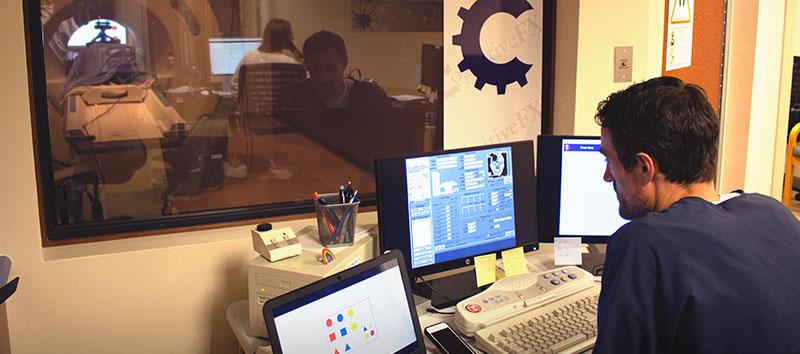
Even if you’ve sustained multiple concussions over time, the kind of treatment you need is the same as for someone who has only sustained a single concussion. However, that doesn’t mean your treatment regimen will look the same as another person’s. The specific therapies you need depend on where the damage in your brain is along with what kind of suboptimal signaling you’re experiencing.
Patients who attend our clinic for post-concussion treatment all go through a battery of testing to evaluate their brains, their autonomic nervous system, their vision, and their vestibular function. Some of that information comes from an fNCI brain scan, which evaluates 56 brain regions. Using the fNCI, we also verify what changes happen in your brain after treatment. You’ll also receive a standard MRI to verify that you have no structural damage that needs more extreme intervention (such as neurosurgery) before you complete treatment at our clinic.
We use your evaluation results to create a custom treatment plan to target the areas of your brain that need help. Treatment involves doing physical and cognitive therapy designed to repair the damaged pathways in their brain. Currently, there is no other method that successfully repairs brain damage from post-concussion syndrome. Whether you’ve had a year-old concussion or years of many concussions, this treatment helps the brain to repair lingering damage from injury.
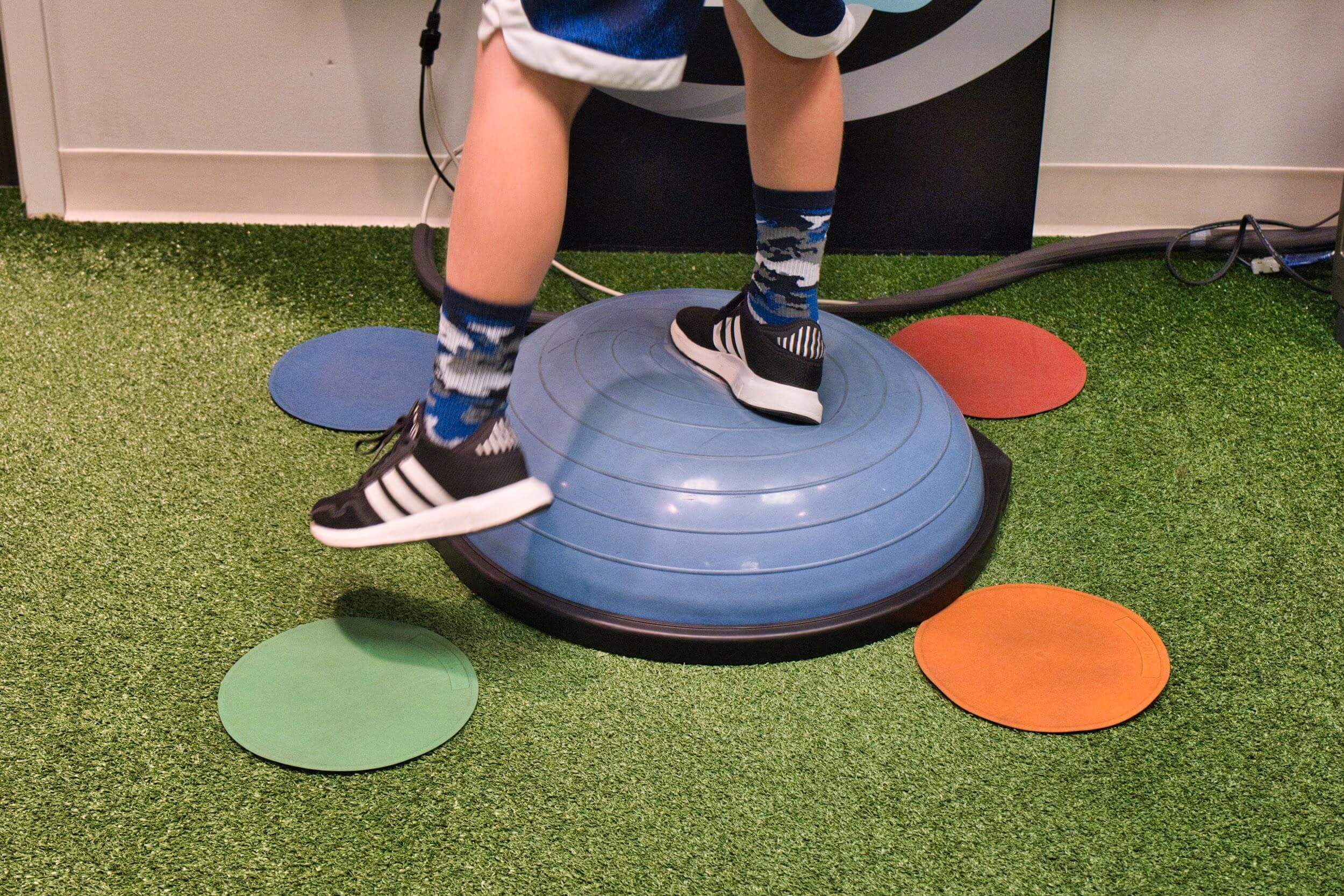
While the fNCI is a key part of our program’s success, the way we combine cardio exercise with multidisciplinary therapies is what brings it all together. There are many types of doctors with at least some knowledge of post-concussion syndrome and it’s treatment — sports medicine doctors, neurology doctors, neuropsychology doctors, physical medicine and rehabilitation physicians, and more — however, most of them don’t have the in-house resources to provide all of the therapy needed for post-concussion syndrome.
Further reading: Types of head injury doctors and What neurologists can do for PCS
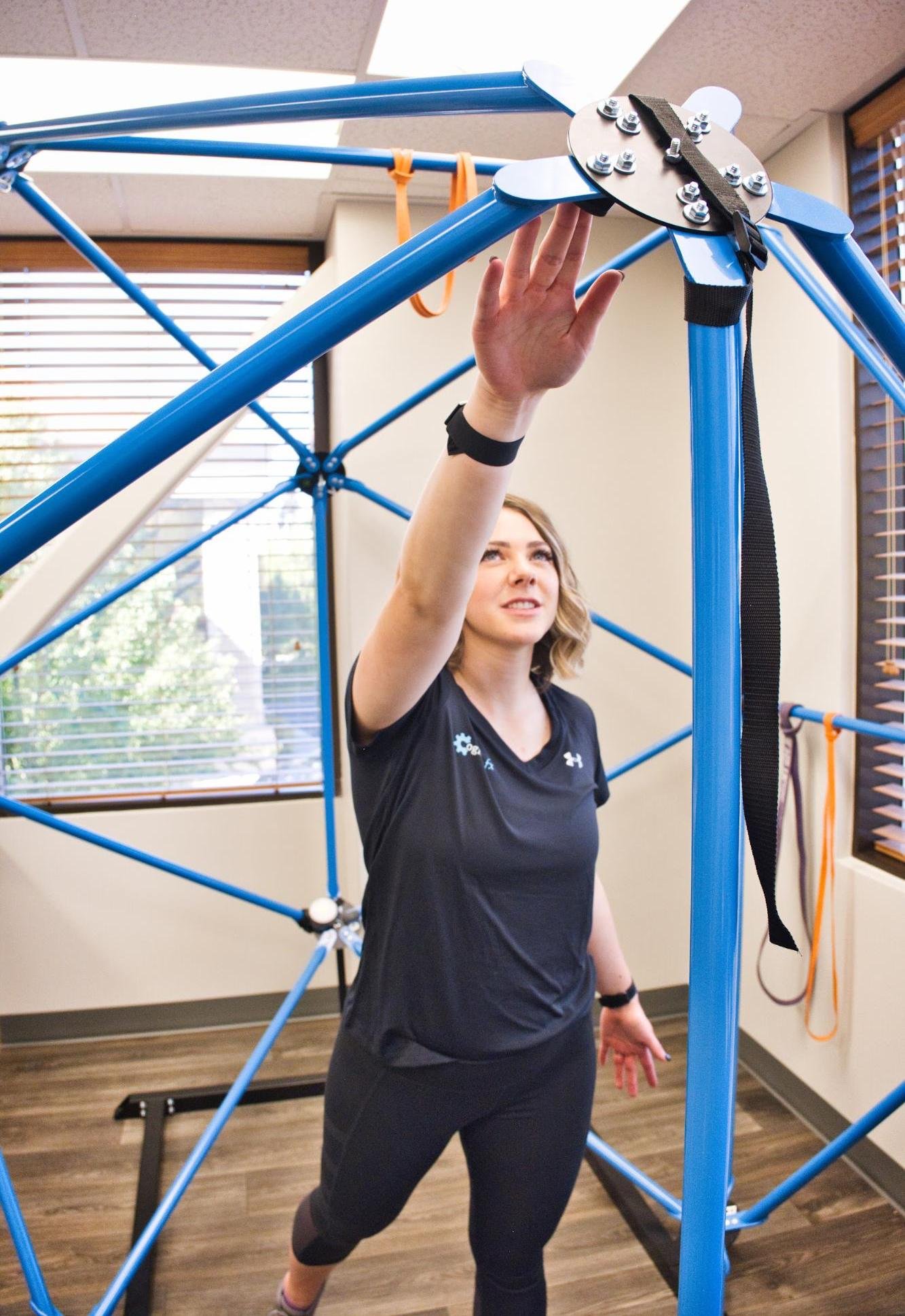
In contrast, our in-house team of treatment providers includes a neuropsychologist, neuroscientists, a neuroradiologist, psychologists, physical and cognitive therapists, and others. Together, they provide a comprehensive approach to combat the cumulative effects of head impacts, including…
Treatment can be an emotional and transformative process. Here’s how Myrthe van Boon, a mother who suffered for years from debilitating symptoms, described part of her treatment week:
Halfway through the week, I went outside during my lunch break and the world looked totally different — brighter and clearer. My head was calm for the first time ever in all those years. It was an amazing and emotional moment. It gave me faith that this was going to work and would make a difference.
Further reading: Recovering from post-concussion syndrome
To date, there is no medicine clinically proven to treat post-concussion syndrome. Many well-intentioned doctors prescribe meds to address specific symptoms, like headaches or sleep problems. But as long as the underlying issues go untreated, those symptoms won’t go away, even if they’re slightly improved by medication. But some patients end up on so many medications that the side effects are just as bad — or worse — than the original concussion symptoms. Oftentimes, these meds don’t help at all and are even more dangerous for pediatric patients because adolescents metabolize medication differently than adults do.
For an in depth discussion, read our post on medication for post-concussion syndrome.
If you’re experiencing symptoms that won’t resolve after multiple concussions, you’re not alone. And you’re not crazy. 90% of our patients show symptom improvement after a week of treatment, with an average improvement of 60% in those symptoms.
To see if you are eligible for treatment, sign up for a consultation.

Dr. Mark D. Allen holds a Ph.D. in Cognitive Science from Johns Hopkins University and received post-doctoral training in Cognitive Neuroscience and Functional Neuroimaging at the University of Washington. As a co-founder of Cognitive Fx, he played a pivotal role in establishing the unique and exceptional treatment approach. Dr. Allen is renowned for his pioneering work in adapting fMRI for clinical use. His contributions encompass neuroimaging biomarkers development for post-concussion diagnosis and innovative research into the pathophysiology of chronic post-concussion symptoms. He's conducted over 10,000 individualized fMRI patient assessments and crafted a high-intensity interval training program for neuronal and cerebrovascular recovery. Dr. Allen has also co-engineered a machine learning-based neuroanatomical discovery tool and advanced fMRI analysis techniques, ensuring more reliable analysis for concussion patients.

Concussions can have long-term physical, cognitive, and emotional effects. Symptoms such as brain fog, headaches, and depression can last for months or years after the initial injury. When the...

Post-concussion syndrome is downright frustrating to experience. Doctors often miss it during diagnosis, and even if they do make the diagnosis, treatment methods vary considerably from clinic to...
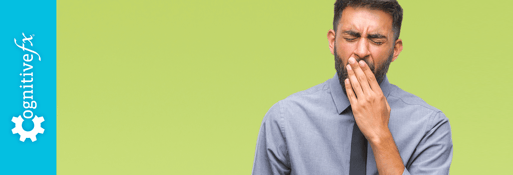
It’s not uncommon for people in today’s society to be tired. The demands on our time seem to be never ending. However, there’s a difference between being tired from being on the go all of the time...

If you’ve recently suffered a concussion, you might be confused about when and how to return to exercise. Maybe you were told to avoid all physical activity until you feel better. But what if that...
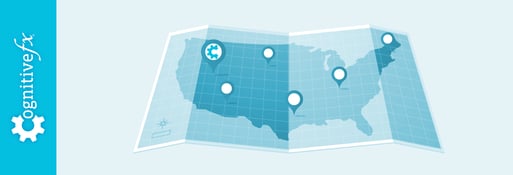
If you're searching for a concussion clinic, you've probably already discovered something frustrating: most doctors will tell you to rest, wait, and hope your symptoms go away on their own.
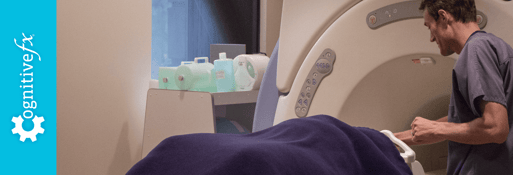
A regular MRI (magnetic resonance imaging) looks at brain structure and integrity. While it helpful for diagnosing structural brain damage, it can’t often be used to detect post-concussion syndrome...
Published peer-reviewed research shows that Cognitive FX treatment leads to meaningful symptom reduction in post-concussion symptoms for 77% of study participants. Cognitive FX is the only PCS clinic with third-party validated treatment outcomes.
READ FULL STUDY